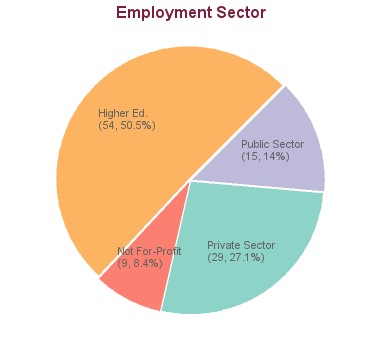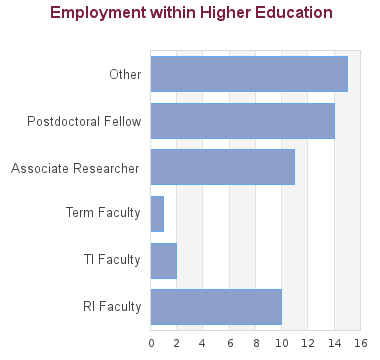
Kevin Johns
Job Title
Medical Science Liaison
Employer
AstraZeneca Canada

Review details about the recently announced changes to study and work permits that apply to master’s and doctoral degree students. Read more
Experimental Medicine is the study of the pathogenesis and treatment of disease. Modern experimental medicine represents a rapidly growing body of knowledge involving the determination of diseases processes and the development of appropriate therapies.
The Experimental Medicine Program is intended for individuals seeking a career in research. The Department of Medicine offers opportunities and facilities for advanced studies in Experimental medicine, leading toward the M.Sc. and Ph.D. degrees. Members of the Department direct research programs in a wide range of basic and clinically relevant areas. There are a variety of special interest areas of national and international stature. Specialties within the Experimental Medicine Program include: Cardiology, Endocrinology, Gastroenterology, Hematology, Infectious Diseases, Medical Immunology, Medical Oncology, Molecular Biology, Nephrology, Neurology and Respiratory Medicine.
The principal emphasis of this graduate program is training in research. Success at this level is traditionally measured by the preparation and defense of a thesis. Course work is required of all students, based on the background of the candidate and the degree program. The work of each Ph.D. candidate will be supervised by a candidate’s Committee consisting of not fewer than three members. These may include faculty members from a department other than that in which the candidate is writing the thesis.
Applicants are not required to have a supervisor at the time of applying, but the application won't be reviewed until they secure a supervisor and all required paperwork is submitted.
The Faculty of Graduate and Postdoctoral Studies establishes the minimum admission requirements common to all applicants, usually a minimum overall average in the B+ range (76% at UBC). The graduate program that you are applying to may have additional requirements. Please review the specific requirements for applicants with credentials from institutions in:
Each program may set higher academic minimum requirements. Please review the program website carefully to understand the program requirements. Meeting the minimum requirements does not guarantee admission as it is a competitive process.
Applicants from a university outside Canada in which English is not the primary language of instruction must provide results of an English language proficiency examination as part of their application. Tests must have been taken within the last 24 months at the time of submission of your application.
Minimum requirements for the two most common English language proficiency tests to apply to this program are listed below:
Overall score requirement: 96
Reading
22
Writing
22
Speaking
22
Listening
22
Overall score requirement: 7.0
Reading
7.0
Writing
7.0
Speaking
7.0
Listening
7.0
Some programs require additional test scores such as the Graduate Record Examination (GRE) or the Graduate Management Test (GMAT). The requirements for this program are:
The GRE is not required.
For admission to the PhD program in Experimental Medicine, the student must hold a M.Sc. degree in life sciences, biology, zoology, biochemistry, or related disciplines.
Deadline to submit online application. No changes can be made to the application after submission.
Transcript DeadlineDeadline to upload scans of official transcripts through the applicant portal in support of a submitted application. Information for accessing the applicant portal will be provided after submitting an online application for admission.
Referee DeadlineDeadline for the referees identified in the application for admission to submit references. See Letters of Reference for more information.
All applicants have to submit transcripts from all past post-secondary study. Document submission requirements depend on whether your institution of study is within Canada or outside of Canada.
A minimum of three references are required for application to graduate programs at UBC. References should be requested from individuals who are prepared to provide a report on your academic ability and qualifications.
Many programs require a statement of interest, sometimes called a "statement of intent", "description of research interests" or something similar.
Students in research-based programs usually require a faculty member to function as their thesis supervisor. Please follow the instructions provided by each program whether applicants should contact faculty members.
Permanent Residents of Canada must provide a clear photocopy of both sides of the Permanent Resident card.
All applicants must complete an online application form and pay the application fee to be considered for admission to UBC.
| Fees | Canadian Citizen / Permanent Resident / Refugee / Diplomat | International |
|---|---|---|
| Application Fee | $116.25 | $168.25 |
| Tuition * | ||
| Installments per year | 3 | 3 |
| Tuition per installment | $1,875.34 | $3,294.66 |
| Tuition per year (plus annual increase, usually 2%-5%) | $5,626.02 | $9,883.98 |
| Int. Tuition Award (ITA) per year (if eligible) | $3,200.00 (-) | |
| Other Fees and Costs | ||
| Student Fees (yearly) | $1,144.10 (approx.) | |
| Costs of living | Estimate your costs of living with our interactive tool in order to start developing a financial plan for your graduate studies. | |
Applicants to UBC have access to a variety of funding options, including merit-based (i.e. based on your academic performance) and need-based (i.e. based on your financial situation) opportunities.
Effective September 2024, successful applicants who will start the Ph.D. program and who do not hold a major scholarship, will receive a minimum stipend of $30,000 per year from their supervisor.
All applicants are encouraged to review the awards listing to identify potential opportunities to fund their graduate education. The database lists merit-based scholarships and awards and allows for filtering by various criteria, such as domestic vs. international or degree level.
Many professors are able to provide Research Assistantships (GRA) from their research grants to support full-time graduate students studying under their supervision. The duties constitute part of the student's graduate degree requirements. A Graduate Research Assistantship is considered a form of fellowship for a period of graduate study and is therefore not covered by a collective agreement. Stipends vary widely, and are dependent on the field of study and the type of research grant from which the assistantship is being funded.
Graduate programs may have Teaching Assistantships available for registered full-time graduate students. Full teaching assistantships involve 12 hours work per week in preparation, lecturing, or laboratory instruction although many graduate programs offer partial TA appointments at less than 12 hours per week. Teaching assistantship rates are set by collective bargaining between the University and the Teaching Assistants' Union.
Academic Assistantships are employment opportunities to perform work that is relevant to the university or to an individual faculty member, but not to support the student’s graduate research and thesis. Wages are considered regular earnings and when paid monthly, include vacation pay.
Canadian and US applicants may qualify for governmental loans to finance their studies. Please review eligibility and types of loans.
All students may be able to access private sector or bank loans.
Many foreign governments provide support to their citizens in pursuing education abroad. International applicants should check the various governmental resources in their home country, such as the Department of Education, for available scholarships.
The possibility to pursue work to supplement income may depend on the demands the program has on students. It should be carefully weighed if work leads to prolonged program durations or whether work placements can be meaningfully embedded into a program.
International students enrolled as full-time students with a valid study permit can work on campus for unlimited hours and work off-campus for no more than 24 hours a week during academic sessions.
A good starting point to explore student jobs is the UBC Work Learn program or a Co-Op placement.
Students with taxable income in Canada may be able to claim federal or provincial tax credits.
Canadian residents with RRSP accounts may be able to use the Lifelong Learning Plan (LLP) which allows students to withdraw amounts from their registered retirement savings plan (RRSPs) to finance full-time training or education for themselves or their partner.
Please review Filing taxes in Canada on the student services website for more information.
Applicants have access to the cost estimator to develop a financial plan that takes into account various income sources and expenses.
124 students graduated between 2005 and 2013: 1 graduate is seeking employment; for 16 we have no data (based on research conducted between Feb-May 2016). For the remaining 107 graduates:


These statistics show data for the Doctor of Philosophy in Experimental Medicine (PhD). Data are separated for each degree program combination. You may view data for other degree options in the respective program profile.
| 2023 | 2022 | 2021 | 2020 | 2019 | |
|---|---|---|---|---|---|
| Applications | 15 | 20 | 36 | 26 | 32 |
| Offers | 7 | 11 | 20 | 8 | 15 |
| New Registrations | 6 | 10 | 13 | 7 | 14 |
| Total Enrolment | 98 | 85 | 94 | 114 | 120 |
Students in research-based programs usually require a faculty member to function as their thesis supervisor. Please follow the instructions provided by each program whether applicants should contact faculty members.
These videos contain some general advice from faculty across UBC on finding and reaching out to a supervisor. They are not program specific.
| Year | Citation |
|---|---|
| 2017 | Dr. Guan studied the effect of the autonomic nervous system and individual stress profile in predicting ischemic stroke after an initial transient ischemic attack. She developed a novel predictive tool for use in emergency and other clinical settings to help physicians identify the high-risk patients and provide personalized medical care for them. |
| 2017 | Dr. Lau engineered an immunogenic tuberculosis vaccine strain that is highly visible to the host immune system. Her work presents a novel approach to tuberculosis vaccine design and paves the way for eradication of the disease. |
| 2017 | Dr. Gabel used advanced medical imaging tools to study how bone strength is gained across 12 years of adolescent growth and the influence of maturity, physical activity and sedentary behaviour in boys and girls. Her unique contributions confirmed adolescence as a critical 'window' for bone health and underscored the importance of physical activity. |
| 2017 | Dr. Patel examined the health and economic benefits of improving drug adherence using text-message based interventions. He found they could efficiently improve patient health in Canada, Kenya and India. His work builds an understanding of how text-message based interventions can add value to infectious disease control worldwide. |
| 2017 | Dr. Chudyk studied the association between the built environment, health and mobility of older adults living on low income. Her work identifies features of the environment that support walking. These findings contribute to our understanding of how to design cities that support the health and independence of a vulnerable subgroup of older adults. |
| 2017 | Using laboratory models, Dr. Toren investigated novel combination treatment strategies against prostate cancer that is resistant to the best current treatments available. His work identified two promising strategies, which subsequently progressed to clinical studies in patients with treatment-resistant prostate cancer. |
| 2017 | Dr. Liu's doctoral studies focused on further uncovering the underlying causes of chronic myeloid leukemia. He discovered a novel protein complex in the leukemia cells and investigated the functional roles of the protein complex in disease development. His research advances our knowledge and understanding in leukemogenesis of chronic myeloid leukemia. |
| 2017 | Dr. Pokrishevsky developed an innovative method for studying protein misfolding and aggregation in Amyotrophic Lateral Sclerosis (ALS). He then used it to identify novel pathological mechanisms in ALS which may lead to the generation of new drugs. His studies may also provide a framework for understanding other neurodegenerative diseases. |
| 2017 | Dr. Chen's work focused on understanding the role of a protein called HMMR in cancer cell division. She demonstrated that HMMR integrates structural and biochemical pathways to ensure the fidelity of cell division. These findings contribute to a better understanding of cancer cell biology and may assist the design of next-generation anti-tumor drugs. |
| 2017 | Dr. Lai investigated an acute myeloid leukemia model to identify and characterise key regulators of leukemia. She determined regions of an oncogene responsible for leukemic initiation, growth and drug resistance, and identified a new gene critical to these properties. Her work provides new insight into leukemia and potential treatment targets. |
Experimental Medicine offers research opportunities in the following specialties: cardiology, cancer biology, dermatology, gastroenterology, hematology/oncology, infectious diseases, molecular medicine, nephrology, neurology, and respiratory medicine. All these fields can involve patients and/or experimental animal models.
Departments/Programs may update graduate degree program details through the Faculty & Staff portal. To update contact details for application inquiries, please use this form.

Find out how Vancouver enhances your graduate student experience—from the beautiful mountains and city landscapes, to the arts and culture scene, we have it all. Study-life balance at its best!